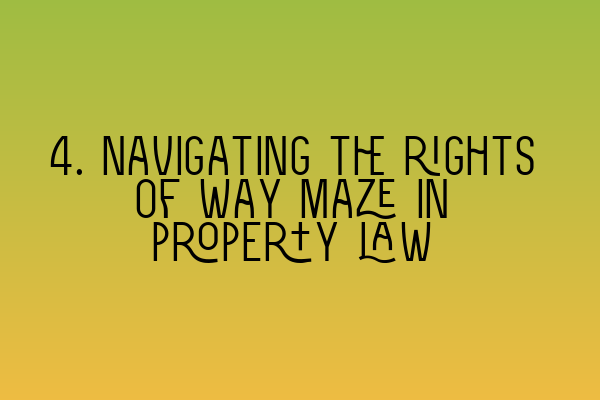Navigating the Rights of Way Maze in Property Law
As property owners or potential buyers, understanding your rights and obligations when it comes to rights of way is essential. While they may seem straightforward at first glance, the world of rights of way in property law can quickly become a complex maze. In this blog post, we will unravel this maze and provide you with a comprehensive guide to navigating rights of way.
1. What are Rights of Way?
To put it simply, a right of way is a legal right that allows someone to pass through a property owned by another person. This right can be granted by the property owner or established by long usage. It essentially gives individuals or businesses the legal right to access their property using a specified route across another person’s property.
2. Types of Rights of Way
There are two main types of rights of way:
a) Express Rights of Way: These are rights that are explicitly granted in legal documents, such as a deed or a lease. They are often created when a property is subdivided, and common routes of access are established for the benefit of all property owners.
b) Implied Rights of Way: Implied rights of way are those that are not explicitly granted but are assumed by courts based on the circumstances surrounding the property. These can include historic use or necessity.
3. Necessity and Presumption of Grant
In some cases, a right of way may be deemed necessary for the reasonable use and enjoyment of a property. This is known as a right of way by necessity. For example, if a landlocked property can only be accessed through another person’s property, the law may imply the existence of a right of way.
Similarly, there is the presumption of grant, which assumes that when a property is divided, the owner of the new parcel of land will enjoy the same access rights as the original parcel. This presumption can be rebutted, but it provides a starting point in determining the existence of a right of way.
4. Establishing a Right of Way
To establish the existence of a right of way, it is crucial to gather sufficient evidence. This may include historic documents, witness testimony, and surveys. It is important to consult a property law expert who can help you gather the necessary evidence and navigate the legal process.
5. Resolving Disputes
Unfortunately, disputes over rights of way are not uncommon. They can arise due to conflicting interpretations of historic use, changes in property ownership, or alterations to access routes. When faced with a rights of way dispute, it is essential to seek legal advice promptly. A solicitor experienced in property law can guide you through negotiation, mediation, or court proceedings to resolve the issue effectively.
6. Check Before You Buy
Whether you are buying a property or land, it is crucial to conduct thorough due diligence before completing the purchase. This includes researching existing rights of way and potential restrictions that may affect your use and enjoyment of the property. A qualified property law solicitor can assist you in this process, ensuring that you make informed decisions.
7. Consult an Expert
Given the intricacies of rights of way in property law, it is crucial to consult a solicitor who specializes in property law and land law. They will have the knowledge and experience to guide you through the legal process and provide you with the best possible advice.
At SQE Property Law & Land Law, our team of expert solicitors specializes in all aspects of property law, including rights of way. We can help you navigate the complexities of rights of way, ensuring that your rights are protected and that any disputes are resolved efficiently.
For further information on property law, explore our other related articles:
– SQE 1 Practice Exam Questions
– SQE 1 Practice Mocks FLK1 FLK2
– SQE 2 Preparation Courses
– SQE 1 Preparation Courses
– SRA SQE Exam Dates
In conclusion, understanding and navigating rights of way in property law can be complex. It is crucial to seek expert legal advice if you are involved in a rights of way dispute or are considering a property purchase. At SQE Property Law & Land Law, we are here to help you understand your rights, protect your interests, and ensure a smooth navigation through the rights of way maze. Call us today to schedule a consultation with one of our experienced property law solicitors.
